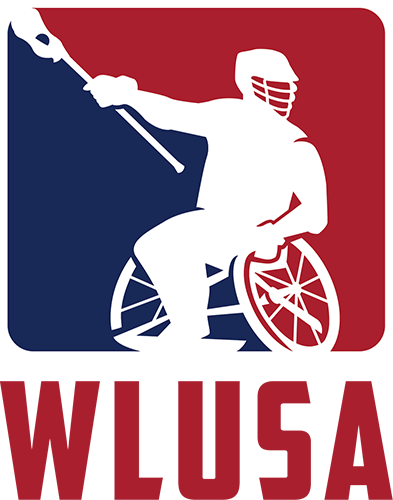Rules
The rules for wheelchair lacrosse are a mix of men's field lacrosse and box lacrosse rules. Wheelchair Lacrosse USA has sought to maintain the authenticity of the game while developing minor adaptations which enhance player safety, fairness, and overall enjoyment.
Overview
Wheelchair lacrosse is played on a solid surface hockey rink. The playing surface is typically sport court or concrete. Practices and introductory sessions may also be played on a basketball court when a rink is not available.
Gameplay is 7v7 (including Goalkeepers) and players can change positions "on-the-fly" similar to sled hockey. Chair-to-chair contact and body checking are allowed as long as contact is made in FRONT of the opponent's wheelchair axle. The game mechanics and penalties are extremely similar to mainstream lacrosse, which makes it easy for existing lacrosse officials, coaches, and fans to get involved.

Wheelchair Lacrosse Rule Guidebook
Rules Summary
| COURT SIZE: | Solid Surface Hockey Rink approx. 185' x 85' |
| GOAL SIZE: | Box Lacrosse Goals 4' x 4' or 4' x 4'9" |
| PLAYERS: | 7v7 (including Goalkeepers) |
| POSITIONS: | 1 Goalkeeper; 2 Defense; 2 Midfield; 2 Attack |
| BALL: | No-bounce lacrosse ball made of solid rubber |
| EQUIPMENT: | Standard men's lacrosse equipment |
| LENGTH OF GAME: | 4 Quarters; 10 minutes each (running time) |
| TIMEOUTS: | 1 timeout per team per half |
| FACEOFFS: | Hockey-style "puck drop" |
| SUBSTITUTIONS: | "On-the-fly" and dead ball substitutions are allowed |
| OFFSIDES: | Each team may have a maximum of 4 players in their Offensive half and 5 players in their Defensive half (including the Goalkeeper) at all times |
| CONTACT: | All chair-to-chair contact and body checking must be made in FRONT of the opponent's wheelchair axle |
| STICK CHECKING: | Controlled stick checking is legal |
| SCREENING: | Stationary and motionless screening of an opponent is legal |
| CHAIR TURNED OVER: | Play should be stopped immmediately |
| PENALTIES: | All NFHS High School Boys' Lacrosse penalties apply, unless otherwise noted |
Oops!
You have unsaved elements
Please save or cancel the pending changes to the elements within your page and then try saving again.
